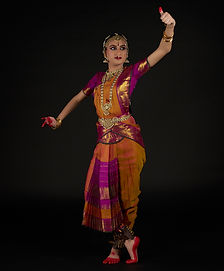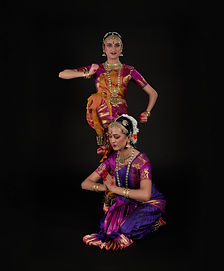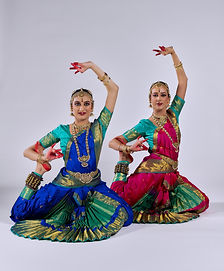top of page
PROGRAM
PUSHPANJALI
Ragam: Arabhi
Talam: Adi
Composer: Kalaimamani Madurai Sri. R Muralidharan
Pushpanjali, which means offering of flowers, is an opening piece in Bharatanatyam. It is an invocation that offers respect to the stage, the audience, the teacher, and the Gods. A notable moment in the Pushpanjali occurs when the dancer gently places flower petals on the stage as a symbolic offering.

SHLOKAMALIKA
Ragamalika
Talam: Adi
Shlokamalika is a dance piece which is an invocation of a pantheon of gods and goddesses in ragamalika. The four shlokas that will be depicted are Mooshika Vahana, praising Lord Ganesha, Saraswati Namastubyam, praising Goddess Saraswati, the first stanza of the Mahalakshmi Ashtakam, praising Goddess Lakshmi, and Angikam Bhuvanam, praising Lord Shiva.
11.jpg)
ALARIPPU
Ragamalika
Talamalika
Composer: Dr. Vasundara Doraiswamy
The word Alarippu refers to the blooming of a flower. This symbolizes the opening of both the dancer’s body and mind in a performance. As a traditional invocatory piece in Bharatanatyam, the Alarippu focuses purely on rhythm (tala) and movement (nritta), gradually progressing from subtle motions of the eyes and neck to full-body coordination. The Alarippu presented today is a Talamalika, meaning it is set to a sequence of multiple rhythmic cycles. It begins with Chaturasram (four beats per lagu), moves into Tisram (three beats per lagu), and concludes with Misram (seven beats per lagu).
4.jpg)
SHABDAM
Ragamalika
Talam: Misra Chapu
Composer: Kalaimamani Madurai Sri. R Muralidharan
The shabdam is an item in which abhinaya, or expressions, are introduced, and the stanzas are separated by nritta. The piece combines abhinaya and different stories with nritta in the form of jathis. Each stanza can contain a different story or all of them put together is one single story. This shabdam praises Lord Rama and depicts the stories of his life.
3.jpg)
VARNAM
Ragam: Shanmukhapriya
Talam: Adi
Composer: Sri. Lalgudi G Jayaraman
The varnam is the centerpiece of an Arangetram. It contains all elements of Bharatanatyam to create an elaborate piece. It seamlessly blends nritta and abhinaya and often contains storytelling passages. The varnam is both technically and emotionally demanding, testing the stamina, skill, grace, and versatility of a dancer. This varnam, Devar Munivar, praises Lord Vishnu and his many forms. In this varnam, the dancers tell two stories. Gajendra Moksha, in which Lord Vishnu grants salvation to two Rishis who were cursed to live as an elephant and a crocodile. Along with that, the story of Mahabali, a powerful king whose generosity was tested by Lord Vishnu.

KEERTHANAM
Ragam: Kedaragaula
Talam: Adi
Composer: Sri. Oothukadu Venkata Subbayyer
Keerthanam is a devotional piece that combines expressive abhinaya with rhythmic footwork. This Keerthanam, Ananda Natamidum, is about the joy of Lord Nataraja's dance. This piece is an energetic combination of intricate footwork and abhinaya that depicts the power and joy of Lord Nataraja’s dance.
2.jpg)
PADAM
Ragam: Cenjurutti
Talam: Eka
Composer: Sri. Oothukadu Venkata Subbayyer
Padams are expressive pieces that serve as a platform to showcase a dancer's mastery of abhinaya. Rather than intricate footwork, padams predominantly use facial expressions and hand gestures to tell stories. Padams usually explore themes of love and devotion and are traditionally sung in Tamil or Telugu. Vishamakara Kannan brings young Krishna’s playful nature to life. The dancer will portray Krishna as the troublemaker he is, sharing stories of his antics that both frustrate and charm those around him.
4_edited.jpg)
TILLANA
Ragam: Desh
Talam: Adi
Composer: Smt. Ranganayaki Jayaraman
The tillana is the final piece of the margam and is an energetic composition that showcases the dancer's strength. Tillanas are primarily focused on nritta but contain small segments of abhinaya. This tillana contains a segment of abhinaya praising Lord Rama.
5.jpg)
MANGALAM
Ragam: Madhyamavathi
Talam: Adi
Composer: Sri. Arunachala Kavirayar
The mangalam is the final segment of an Arangetram in which the dancer expresses gratitude and asks for blessings for themselves and those around them. This mangalam praises Lord Rama and concludes the Arangetram.
9.jpg)
bottom of page
